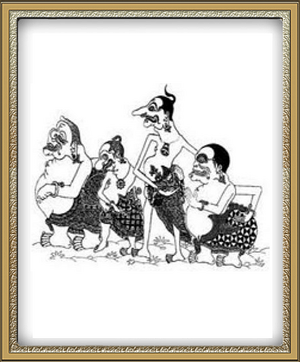Punokawan - (Wayang Kulit): Difference between revisions
No edit summary |
No edit summary |
||
| Line 1: | Line 1: | ||
[[File:Punokawan.jpg|thumb|455x455px|''Punokawan - Semar and his three sons'']] | |||
[[File:Punokawan.png|thumb]] | |||
{{Puppets | {{Puppets | ||
|Title=Punokawan - (Servants) - All stories | |Title=Punokawan - (Servants) - All stories | ||
Latest revision as of 17:18, 24 November 2024
| Title | Punokawan - (Servants) - All stories |
|---|---|
| Other names | Panakawan |
| Size | 45 cm |
| Personal data | Sang Hyang Tunggal considers Semarlah the old man and predicts that he will not be able to associate with the Gods and orders, so that he stays in the world to nurture the descendants of the Gods who are embodied and human. After Semar lived in Marcapada (the world), his appearance changed from good to very ugly. All signs of ugliness on the human body were found in Semar, so that Semar was considered an ordinary human being. |
| Appearance | Semar has a unique and meaningful physical form. His physical form is as if it were a symbol of the depiction of the universe. One of his physical characteristics is a white tuft, the white tuft is a symbol or has the meaning of clear thoughts, ideas or creation. Gareng has the physical characteristics of kero eyes, limping hands and limping legs. These three physical characteristics have meaning or symbolize feelings. Kero eyes mean alertness, cekot hands mean precision and limping legs are carefulness. Petruk's two hands are his distinctive features. The front hand points, choosing what is desired, and the back hand tightly grips what has been chosen. This symbolizes or means will, desire and will. Bagong's five fingers are wide open which symbolizes always being willing to work hard. |
| Collection | Private collection |
Punokawan – (Servants) – All stories
In the world of puppetry, there is a term called sedulur papat lima pancer, sedulur papat is punokawan, and lima pancer is Ksatria (Pandawa knights). This means that the term sedulur papat lima pancer is a symbol of a knight and his four servants.
The Punokawan characters are Semar, and his three children, namely Gareng, Petruk and Bagong (Cepot).
Semar is known as the caretaker and advisor of the Saptaarga descendants. In the puppet story, Punokawan are loyal guards of the knights who have wise/good characters.
In the shadow puppet show, these four characters usually appear in goro-goro. Their presence often makes the audience laugh. By the puppeteers, these punokawan are indeed played with jokes. But behind their jokes, there are actually advice, suggestions and criticisms. Therefore, Punokawan plays an important role, because they often determine the direction of the knights they guard.
The four of them are called Panakawan, and in Mahabharata they are the servants of the five Pandhawa brothers (Javanese version). In the Ramayana epic they are the servants of Rama and Laksmana (Javanese version).
If the puppet performance takes place during the daytime (in the villages of Java shadow puppet shows happen during the day or the night), the character Bagong usually does not appear with Semar, Gareng and Petruk, but if the puppet performance takes place at night all four will appear together. This generally has to do with the fact that the daytime performances are shorter than the all-night shows.
Blog: Hadisukirno – Yogyakarta - 2012


